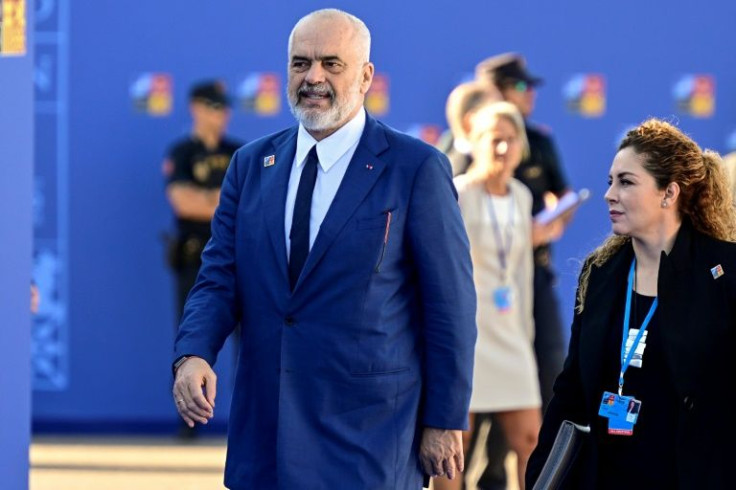Iran's Cyber Attack On Albania Warrants Increased NATO Involvement

The intent of Iran's cyber attack of Albania in July was to knock the Baltic nation back into the last century. Following Albania's rejection of communism in 1997, its citizens have been working hard to overcome decades of infrastructure neglect and catch up with their western European neighbors.
Since his assumption of office in 2013, Prime Minister Edi Rama has been leading the way. Having visited Albania numerous times in the past decade and personally been in office calls with Rama, I have watched the unfolding progress. An artist by academic training, he has set out to make his vision of Albania's future into a canvas of reality.
One of his first steps was to upgrade the efficiency of government bureaucracy. Without having kept up with technology, Albanian bureaucracy moved on paper. It took months for citizens to apply and wait for a simple document like a driver's license. Compared to American and western European administrative processes, Albania's was at best stuck in the 1970s.
In 10 years, Albania has moved rapidly. One of Rama's first decisions was to assign the mission of digital transformation to the National Agency of Information Security (NAIS). As declared in its own mission focus, the role of NAIS is to research fields including digitalization, systems interconnection, centralized online services, issues and solutions for information infrastructure, electronic payment, and electronic governance in Albania.
Led by Dr. Mirlinda Karcanaj, one of the most accomplished and capable Computer Network Operations experts in Europe, NAIS has been critical in raising Albania's e-Participation Index of the United Nations from 101st in 2011 to 36th in 2022. This success has been achieved through the established success elements of leadership, legislation, institutional set-up, infrastructure, and human resources.
While not micromanaging or meddling in NAIS operations, Prime Minister Rama provides direct oversight. His involvement allows for immediate availability and direct resolution of inner-governmental difficulties. Having the head of the ruling party involved allows for easier passage of legislation. These successes are exactly what the Iranian government was intending to collapse last July.
The primary reason for Tehran's aggression has been the acceptance of Iranian dissidents into Albania. The people of Albania have a history of opposing injustice and genocide. Albanian citizens state with pride that more Jewish people lived in their country when Nazism ruled Germany than before its rise.
Prime Minister Rama has met the legacy of his fathers. He ordered out of Albania the Iranian Ambassador when it was discovered that the diplomat was a Ministry of Intelligence and Security (MOIS) agent. MOIS is the same Iranian terrorist organization that was thwarted in its attempt to bomb a Paris convention in 2018. If not for the combined actions of Belgian, French, and German law enforcement agencies, that plot would have succeeded. Albanian police were successful in preventing a subsequent MOIS bombing plot against the Iranian dissidents living northwest of Tirana.
July's Iranian attack did a lot of damage to the Albanian cyber infrastructure. A joint investigation involving the Albanian cyber community, the U.S. Federal Bureau of Investigation, and Microsoft have determined that prior to the July attack, the MOIS spent fourteen months in preparation. This included exploitation and establishing the four subordinate hacker operations to simultaneously launch the attacks.
Once cyber capabilities have been installed and implemented, Computer Network Operations consist of three primary elements, Computer Network Defense (CND) including Response Actions (CND-RA), Computer Network Exploitation (CNE), and Computer Network Attack (CNA). Fortunately, the work already accomplished by NAIS and other participants of Albania's cyber community prevented far more serious damage. Albania will recover and use the lessons of July's attacks to enhance its CND and CND-RA capabilities. It will also be able to implement improved indication and warning systems for CNE and CNA from Iran and all other adversaries, be they nation states or criminals.
As Albania recovers and enhances its CNO capabilities, NATO needs to become more actively involved. In 2009 Albania became a member of NATO and warrants the collective protection of the European and North American participants. Signed in 1949, Article V of the North Atlantic Treaty states, "The Parties agree that an armed attack against one or more of them in Europe or North America shall be considered an attack against them all…"
The MOIS assaults on Albanian government and financial infrastructures were armed attacks through the electromagnetic spectrum. The term "armed" does not just apply to kinetic attacks. Non-kinetic attacks can be more strategically destructive to the critical infrastructures of a nation. Well planned and executed CNAs can destroy the operational ability of governments and businesses, which is what the MOIS set out to accomplish.
Air, land, sea, space, and cyber-space are the five established battle domains. Albert Einstein correctly stated, "The world is a dangerous place, not because of the people who are evil, but because of the people who do nothing about it." Per its own treaty, NATO has a responsibility to help member-nation Albania defend itself against aggression.
Albanians have come a long way in a short time period. They should not be expected to make the trip alone.
Retired Col. Wes Martin served as Senior Antiterrorism Officer for all Coalition Forces in Iraq and as Department of Army Chief of Information Operations





















